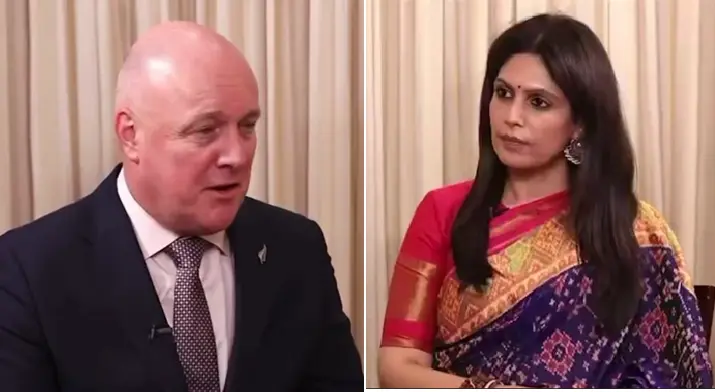
Palki Sharma’s bold question to New Zealand PM Luxon ignites global debate on Khalistani extremism (X@@TimesAlgebraIND)
A Heated Exchange: Freedom of Speech vs National Security
In a recent interview that caught global attention, Indian journalist Palki Sharma asked a tough question to New Zealand Prime Minister Christopher Luxon. The topic? Khalistani elements allegedly operating from New Zealand and India’s growing concerns about their activities.
When asked how New Zealand plans to deal with these separatist groups, PM Luxon responded, “We believe in freedom of speech within legal boundaries. We expect protests to be lawful. If there are violations, our police enforce the law”. His answer reflected New Zealand’s commitment to democratic values and civil liberties.
But Palki wasn’t satisfied. She fired back with a sharp comparison: “If Al-Qaeda or ISIS demanded a referendum in New Zealand, would you still say the same?” Her question wasn’t just rhetorical, it was a challenge to the idea that all speech, even potentially dangerous speech, should be protected under the banner of democracy.
India’s Concerns: Why This Matters
India has repeatedly raised alarms about Khalistani groups operating from foreign soil, including Canada, the UK, and New Zealand. These groups advocate for a separate Sikh state and have been linked to anti-India propaganda and even violent incidents.
For India, the issue isn’t just about speech, it’s about sovereignty and security. When foreign nations allow such movements to operate freely, it can strain diplomatic ties and create tension between communities. India wants its allies to take a firmer stance against extremism disguised as activism.
Palki Sharma’s question echoed the sentiment of many Indians who feel that Western countries are not doing enough to curb separatist movements that threaten India’s unity. Her comparison to terrorist organizations like Al-Qaeda and ISIS was meant to highlight the seriousness of the issue.
New Zealand’s Stand: Balancing Rights and Responsibility
PM Luxon’s response shows the delicate balance that democracies must maintain. On one hand, freedom of speech is a cornerstone of democratic societies. On the other, governments must ensure that this freedom is not misused to promote hate, violence, or separatism.
Luxon emphasized that any actions must comply with New Zealand’s legal framework. He also acknowledged India’s concerns and expressed a desire to deepen ties between the two nations, including cooperation in defense, trade, and education.
But critics argue that simply relying on legal boundaries may not be enough. Extremist groups often operate in gray areas, using social media and public events to spread their message without crossing legal lines. This makes enforcement difficult and raises questions about whether current laws are adequate.
The Bigger Question: Where Do We Draw the Line?
Palki Sharma’s bold question has sparked a wider debate: Where should democracies draw the line between free speech and national security?
Is it acceptable to allow groups that promote separatism or glorify violence to operate freely as long as they don’t break the law? Or should governments take a more proactive approach, especially when such movements threaten the peace and unity of allied nations?
This isn’t just a New Zealand issue, it’s a global one. As countries become more interconnected, the actions of one group in one country can have ripple effects across borders. Diplomacy, law enforcement, and public awareness all play a role in finding the right balance. In the end, Palki Sharma’s question wasn’t just a knockout moment in an interview, it was a wake-up call. It reminded us that freedom of speech is powerful, but with power comes responsibility. And when that power is used to threaten peace, it’s time for democracies to rethink where they stand.
Also read – Canada’s Khalistan Reckoning: A Diplomatic Reset or a Dangerous Gamble?
Stay updated with latest updated news blogs on Rapido Updates.